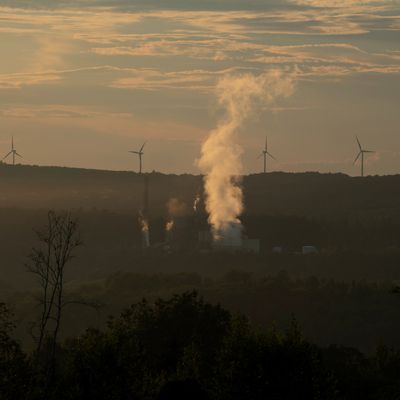
The COVID pandemic has provided climate hawks with plenty of cause for despair. The fact that America’s capacity for misgovernance, ideological delusion, and consumerist myopia has proved vast enough to sustain opposition to indoor-dining restrictions and facial masks — even after a viral illness put 463,000 Americans in the ground — does not bode well for the prospects of a green awakening. The threat that COVID poses to the public is more universal than any discrete climate disaster is likely to be. And the policies necessary for mitigating the pandemic — universal mask-wearing and sustained lockdowns — demand less economic disruption and more immediate payoff than those necessary for affecting a rapid energy transition ever will.
More concretely, while the pandemic did yield the largest annual carbon-emissions reduction on record, this nevertheless proved much smaller than analysts had initially expected, as energy demand rebounded by the end of the year. The current trend line suggests that the world could catch back up to its pre-pandemic pollution potential by 2022.
But the news isn’t all grim. In addition to the ouster of a manically pro-pollution administration from the White House, and a brightening in climatologists’ forecasts, a new study finds that coal’s share of global energy production has plummeted since the pandemic’s onset.
In a report released Monday, researchers at the Potsdam Institute for Climate Impact Research show that the COVID-19 pandemic did not just reduce emissions by depressing electricity demand in the U.S., India, and Europe but also by shifting the composition of energy sources supplying electricity to those three regions. During previous downturns, natural-gas-fired power plants had the brunt of sagging electricity demand, as their operating costs typically outstrip those of coal plants. But by triggering an extraordinary drop in commuting and flying, the pandemic rendered gas so cheap, coal power became more expensive than gas power. This shrank coal plants’ share of electricity production, thereby enhancing COVID-induced emissions reductions: As the New York Times reports, in some regions, “a 20 percent decrease in coal demand from 2019 monthly averages corresponded with decreases in carbon dioxide emissions of up to 50 percent.”
The pandemic’s toll on coal offers an opportunity to mine durable climate progress from the past year of mind-boggling tragedy: Even as the dirtiest of all power plants took a financial beating last year, global wind- and solar-power capacity actually increased in 2020. And with governments in the United States and Europe looking to reduce unemployment through public investment in green energy, the post-pandemic recovery could accelerate the transition toward low-carbon power.
“We are not saying we predict that coal will be phased out,” Potsdam Institute director Ottmar Edenhofer told the Times. “What we are saying is, this is now a splendid opportunity, and it would be good if energy ministers and finance ministers around the globe will take advantage of the situation.”
For developing countries that rely heavily on coal-powered infrastructure — and cannot currently finance major investments in green technology without assuming high borrowing costs — the imperative to revive growth may take precedence over greening the energy grid. Absent efforts to subsidize and incentivize sustainable development in such nations, the world could witness “a brown recovery” in which coal capacity expands, the study warns.
Thus, capitalizing on the opportunity to secure durable ecological progress will require the governments of wealthy nations to recognize humanity’s collective interdependence. Just as the denial of medical care and protective equipment to low-income workers threatens the health of more privileged individuals by facilitating COVID’s spread, so, too, does the denial of capital to low-income nations threaten the well-being of more privileged ones by incentivizing a cheap and dirty form of recovery.































